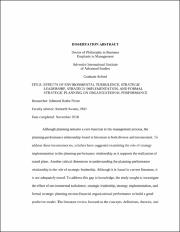Effects of environmental turbulence, strategic leadership, strategy implementation, and formal strategic planning on organizational performance
Abstract
Although planning remains a core function in the management process, the planning-performance relationship found in literature is both diverse and inconsistent. To address these inconsistencies, scholars have suggested examining the role of strategy implementation in the planning-performance relationship as it supports the realization of stated plans. Another critical dimension in understanding the planning-performance relationship is the role of strategic leadership. Although it is found in current literature, it is not adequately tested. To address this gap in knowledge, the study sought to investigate the effect of environmental turbulence, strategic leadership, strategy implementation, and formal strategic planning on non-financial organizational performance to build a good predictive model. The literature review focused on the concepts, definitions, theories, and
indicators of the variables under study. It also reviewed the theoretical and empirical findings on the relationship between those variables.
Adopting a positivist perspective, the study followed a quantitative approach, using a cross-sectional design and survey as strategy in collecting data to test 6 hypotheses. Using structural equation modeling, this study developed a model to explain non-financial organizational performance by studying its antecedents. Data for this study was collected in Haiti using a 5-point Likert Scale rated questionnaire from 274 respondents. Stratified random sampling was used to select the institutions and convenience sampling to select the respondents for the study.
The structural equation modeling was used to analyze the data and answer the research questions of this study. Environmental turbulence directly and positively influences strategic leadership and strategy implementation. It also indirectly influences formal strategic planning and organizational performance. Strategic leadership directly and positively influences strategy implementation, has direct and indirect effects on formal strategic planning, and indirectly affects organizational performance. Strategy implementation directly influences formal strategic planning and indirectly organizational performance. Particularly, formal strategic planning was the only variable that has a direct effect on organizational performance. Further, environmental turbulence was found to be a good predictor for organizational performance in this model. The model that emerged explained 94% of the variance observed in non-financial organizational performance.
The findings contribute significantly to the body of knowledge on strategic management and organizational performance. The practical implication of the study is in
the area of understanding environmental turbulence, playing strategic leadership roles, detailing action plan for strategy implementation, and formalizing strategic planning processes. First, managers, CEOs, directors, and board members playing leadership roles should learn to interact with environmental turbulence because it influences formal strategic planning and ultimately organizational performance through strategy implementation and strategic leadership. Second, managers, CEOs, directors, and board members need to assume strategic leadership roles as it influences organizational performance through formal strategic planning. Third, organizations need to have a detailed action plan for strategy implementation as it influences organizational performance through formal strategic planning. Fourth, organizations need to strengthen their formal strategic planning processes as it directly influences organizational performance. Future studies can consider adding strategy evaluation and control to the model to enhance its usefulness. In addition, future researchers can also consider the internal environment of the firm in developing a more complete model.
Collections
Related items
Showing items related by title, author, creator and subject.
-
Organizational commitment and teaching performance of SDA Elementary School Teachers in South-Central Luzon
Susada, Isabelo V. (Adventist International Institute of Advanced Studies, 2008-05)This study investigated potential relationships between the organizational commitment and teaching performance of Seventh-day Adventist elementary school teachers in South-Central Luzon. This involved 123 teachers from 30 ... -
Transformational leadership, school climate, faith maturity, and organizational citizenship behavior
Njagi, Salome (Adventist International Institute of Advanced Studies, 2012-03)This study looks at some potential significant variables in Adventist schools in relation to organizational citizenship behavior (OCB). The study is designed to address the problem, ―To what extent does the transformational ... -
The Influence of spirituality and transformational leadership to conflict management : a basis towards developing a model program for conflict management styles of pastors of Central Philippine Union Conference
Echavez, Raymond A. (Adventist International Institute of Advanced Studies, 2017-03)One of the greatest needs of pastors of Central Philippine Union Conference (CPUC) is to know how to handle conflict explicitly among pastors, administrators, and church members. Thus, this study explores the relationship ...


